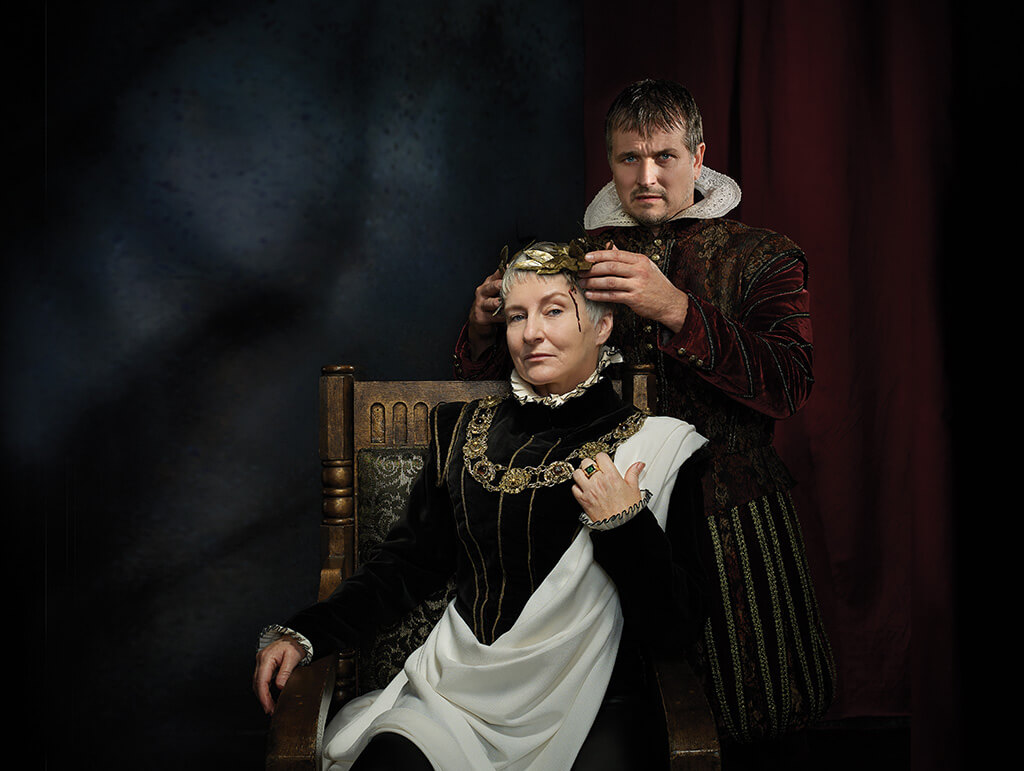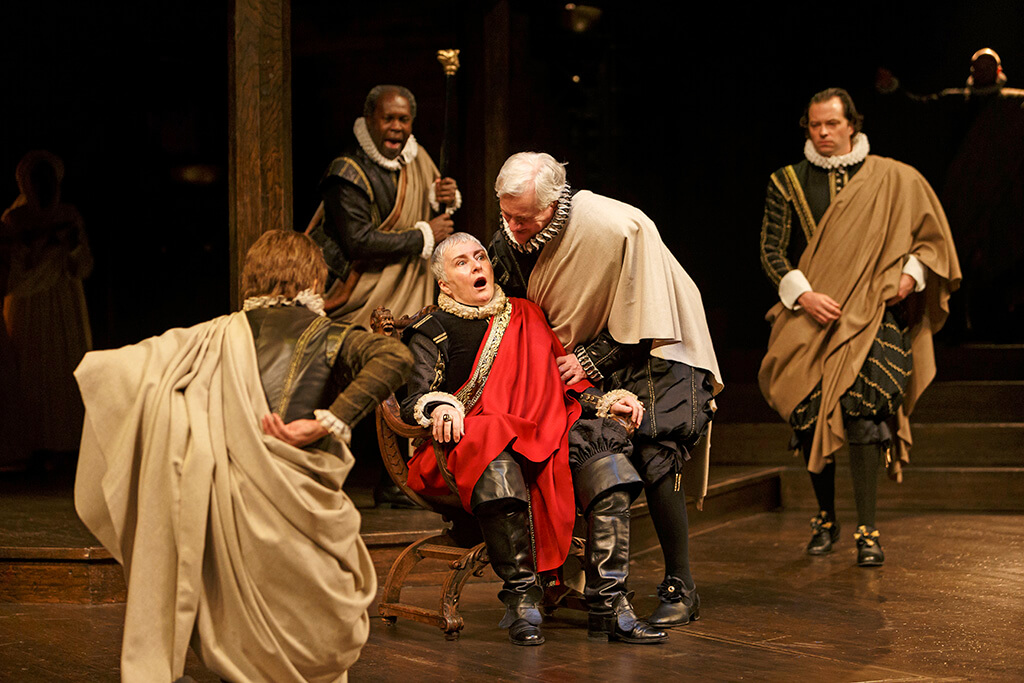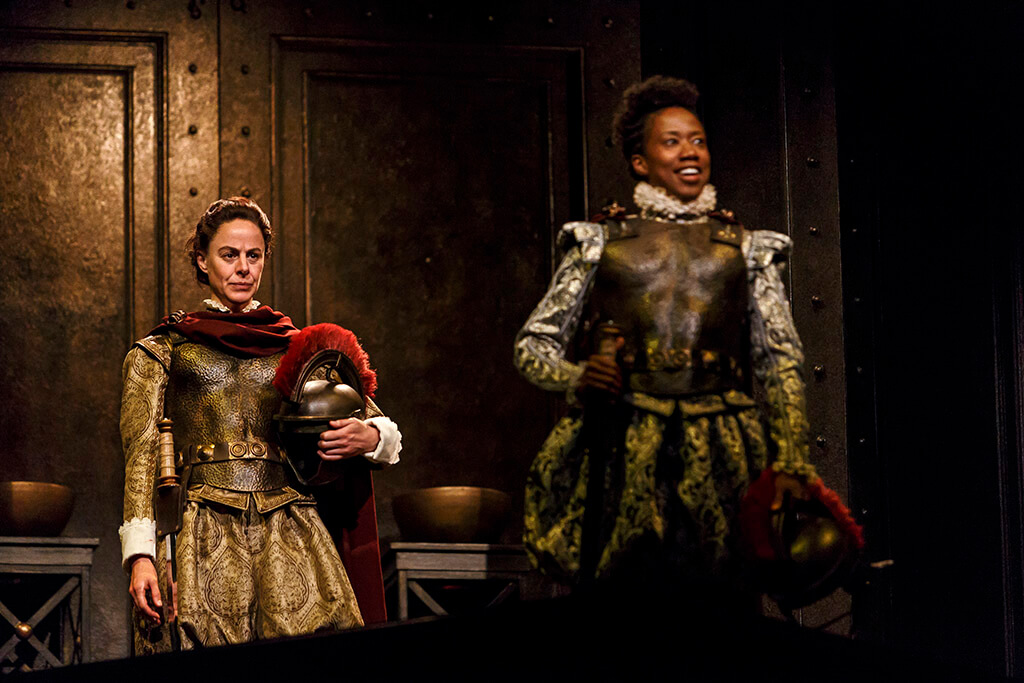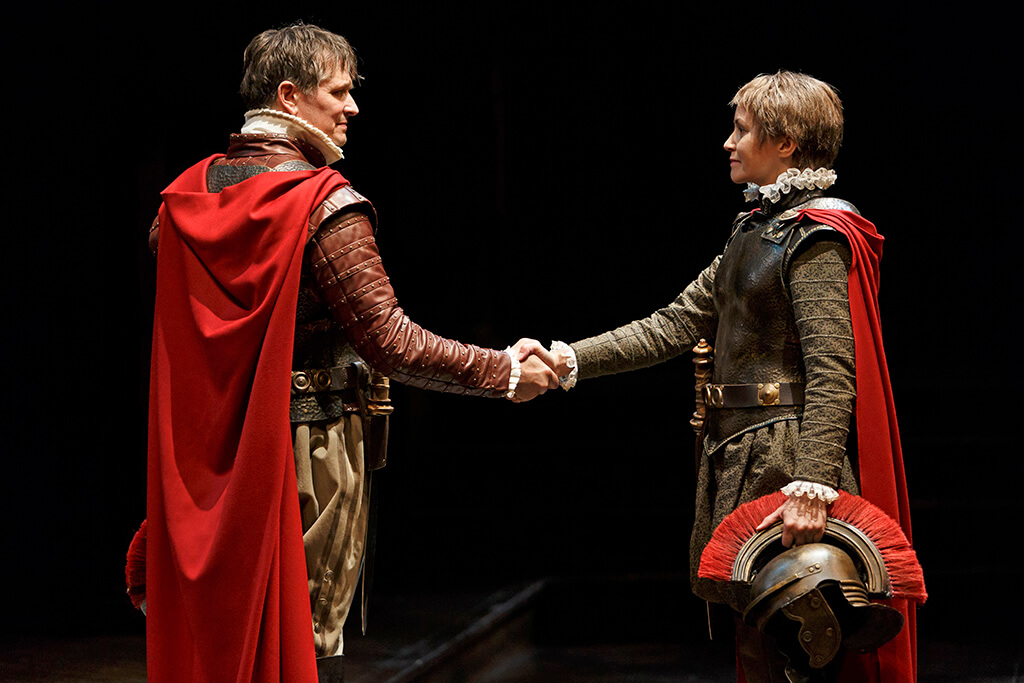
Stratford Festival 2018/ Julius Caesar by William Shakespeare, directed by Scott Wentworth, Festival Theatre, July 31 to Oct. 27. Tickets available at 1-800-511-7429 or www.shawfest.com
Scott Wentworth’s production of Julius Caesar is an equal opportunity employer. The director has cast both men and women in the male roles that constitute the dramatis personae. (In fact, there are only two female characters in the entire play.) In his program notes, Wentworth details his hope that the infusion of female voices and energies into the patriarchal world of the play, will remind the audience that there is more to the world of politics and power than male-driven aggression and competitiveness. He wants to “unlock the metaphorical life” of the play, or so he says. Well, Scott, I hate to tell you this, but in watching this mix of men and women strut their hour upon the stage, no metaphors were unlocked for me. Rather, I rejoice at your gender-equality casting for another reason entirely. There is a dearth of great characters for women to perform in Shakespeare’s tragedies and history plays. In this production, excellent female actors are given wonderful roles to tax their talents. That’s the most important thing, and metaphors be damned. I sincerely hope that we see more mixed casting in the future.

Julius Caesar (Seana McKenna) may give his name to the title of the play, but he is not the main character. That honour falls to his chief assassins, Brutus (Jonathan Goad) and Cassius (Irene Poole). They are opposed in the civil war that follows Caesar’s death, by Octavius Caesar (Sophia Walker) and Mark Antony (Michelle Giroux). Thus, four of the five leading roles are played by women. The conspirators who plot Caesar’s assassination fear that the wildly popular general will become king of Rome and a tyrant, and so destroy the cherished ideal of the Roman republic and the freedom of the citizenry.
At the end of the play, Antony says of the dead Brutus, “This was the noblest Roman of them all”, and that is the fascination of the character. Brutus has no ambitions for himself. He truly believes that by joining the conspiracy to kill Caesar, he can help save the republic. Throughout the play, Brutus fights to keep true to his high moral compass. Alas, Goad does not present a full and satisfying portrait of this complex man who puts honour above everything. In fact, Goad is the weak link in an otherwise stalwart cast. In the classic repertoire, he is an actor who recites lines rather than comes to grips with deep emotion or thought. His Brutus is superficial, and while his first act is tolerable, his performance completely falls apart in the second. His reaction to Caesar’s ghost is mock-horror, and it is all downhill from there, including a throwaway death scene. At the core of the play is the complicated relationship between Brutus and Cassius, but Goad brings nothing to the table. He might as well have mailed in his lines, leaving poor Poole to act for two.

Poole, in fact, runs away with the show. Her Cassius is simply dazzling. The character’s tragic flaw is that he is in awe of Brutus, and against his better judgement, gives in to every bad decision that Brutus makes. It would be easy to play Cassius as manipulative, ambitious, and dangerous, as Caesar describes him, but Poole finds the humanity and the compassion in this imperfect man. By the time of his death, he is a noble soul. Giroux presents an interesting Antony, because right from the start she finds his duplicitous and cynical nature. Whether inciting the mob against the conspirators in his famous funeral oration, even though he promised not to, or calmly dividing up the Roman empire with his co-triumvirs, Giroux’s Antony is someone strictly out for himself. McKenna is a delight as Caesar, sarcastic and shrewd one moment, querulous and grumpy old man the next, but always radiating power as if to the manor born. Walker as Octavius is the wilful boy who will grow up to become emperor and destroy the republic. He is cocksure, abrupt, dismissive, and downright scary. He also puts Antony in his place.
In truth, everyone on stage is terrific. For example, little cameo roles make strong impressions — the tribunes Flavius (Monique Lund) and Marullus (Tim Campbell), Artemidorus (Sean Arbuckle), Cinna, the poet (Randy Hughson), Young Cato (Bahareh Yaraghi). All sorts of established Stratford actors are among the so-called extras – the citizens and soldiers — and Wentworth’s mob scenes are absolutely terrifying because he makes maximum use of the talent at hand. The director has reduced 49 characters to just over 30, and has judiciously combined several roles into one. As a result, the play lopes along at a quick pace, yet the clarity of language is superb. In fact, every line can be heard for its meaning.

The play is set in Shakespeare’s own time, and the effective Elizabethan dress is courtesy costume designer Christina Poddubiuk. Each character has a unique signature. Antony, for example, is a dandy whose tunic has higher and bigger shoulders than anyone else. Thus, we are seeing the play as the Globe Theatre audience would have done. The Elizabethan setting, strangely enough, gives the play a contemporary feel, awash in tension and angst. Composer Paul Chilton’s Renaissance religious score is a strange choice, but it is in keeping with the times, although his heraldic music is powerful indeed.
In short, Wentworth is an impressive director, and this production remains absorbing throughout, despite a casting problem.
- INTERVIEW | Actor Diego Matamoros Takes On Icon Walt Disney In Soulpepper Production Of Hnath Play - April 16, 2024
- SCRUTINY | Opera In Concert Shine A Light On Verdi’s Seldom Heard La Battaglia Di Legnano - April 9, 2024
- SCRUTINY | Lepage & Côté’s Hamlet Dazzles With Dance And Stagecraft Without Saying Anything New - April 5, 2024



